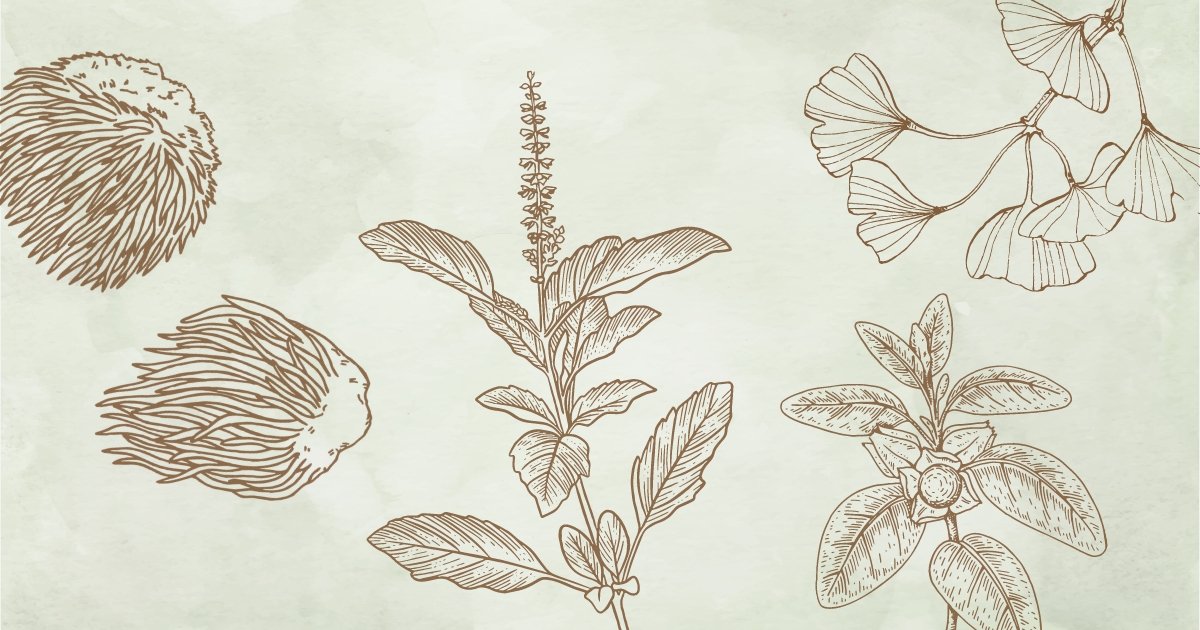Log in HERE

Understanding Nootropics: Herbs & Mushrooms for Brain Health
Nootropics are a category of herbs containing natural compounds that enhance cognitive function. Understanding how nootropic herbs and mushrooms can support brain health makes it easy to unlock creativity, sharpen focus, enhance productivity, and banish brain fog.
Disclaimer: This blog is for educational purposes only and is not a substitute for medical advice. Please consult your health care practitioner before adding any new herbs to your wellness routine.
History of Use
Documented use of nootropics can be traced as far back as 6000 BCE within Ayurvedic manuscripts. Referred to as “Medhya Rasayanas,” these herbs were known to improve memory and intelligence. The use of natural nootropics comes up in other manuscripts throughout Arabia, Egypt, and Sumeria, to name a few (1).
The term “nootropics” was coined in the 1960s, when chemist and psychologist C.G. Giurgea used it to describe a group of substances that can enhance brain function. Their name comes from the Greek words "nous," meaning mind, and "trepein," meaning “to bend.”
Over time, more scientists began to research the potential of nootropics, leading to the creation of many other substances that boost cognitive function. In our fast-paced, modern world, many people use them to enhance memory and focus, or to simply improve their overall quality of life.
Our Top Herbs & Mushrooms for Brain Health
Ashwagandha
In a study done on adults struggling with cognitive impairment, Ashwagandha proved helpful. Participants took either 300 mg of Ashwagandha or a placebo twice per day for 8 weeks. The Ashwagandha group saw immediate and sustained improvements in memory, executive function, focus and information processing (2).
Find Ashwagandha in our Uplifted Spirits Tincture.
Ginkgo
This herbal ally is another neuroprotective brain booster. Ginkgo can greatly improve concentration and alertness while decreasing debilitating symptoms like tinnitus and dizziness (3). With consistent use, Gingko can support short-term and long-term memory improvements (4).
Find Ginkgo in our Clarity Artisan Tea.
Holy Basil
Holy Basil can cultivate capacity for better short-term memory and cognitive flexibility – our ability to learn – by soothing stress and boosting glutathione peroxidase activity. This is an enzyme that increases antioxidant levels and protects the brain cells and neurons from oxidative damage (5, 6).
Find Holy Basil in our Adapt Artisan Tea.
Lion’s Mane
There have been several studies done using Lion's Mane to treat neurodegenerative diseases such as Multiple Sclerosis, Parkinson’s, and Alzheimer’s. While results vary, they show compelling evidence that supports improved myelination of nerve fibers. Results also show suppression of the inflammatory process responsible for brain damage (7).
Try Lion’s Mane in Capsule, Powder, or Tincture form.
Curious to learn more about Nootropics? Check out this webinar, hosted by our Co-Founder, Yarrow Willard, that dives into herbs that support mind and mood.
References
- Lorca, C., Mulet, M., Arévalo-Caro, C., Sanchez, M. C., Perez, A., Perrino, M., Bach-Faig, A., Aguilar-Martínez, A., Vilella, E., Gallart-Palau, X., & Serra, A. (2022). Plant-derived nootropics and human cognition: A systematic review. Critical Reviews in Food Science and Nutrition, 1–25. https://doi.org/10.1080/10408398.2021.2021137
- Choudhary, D., Bhattacharyya, S., & Bose, S. (2017, February 21). Efficacy and Safety of Ashwagandha (Withania somnifera (L.) Dunal) Root Extract in Improving Memory and Cognitive Functions. Journal of Dietary Supplements, 14(6), 599–612. https://doi.org/10.1080/19390211.2017.1284970
- B, S. (1997). Clinical improvement of memory and other cognitive functions by Ginkgo biloba: review of relevant literature. Advances in Therapy, 15(1), 54–65.
- Wesnes, K., Ward, T., McGinty, A., & Petrini, O. (2000). The memory enhancing effects of a Ginkgo biloba/Panax ginseng combination in healthy middle-aged volunteers. Psychopharmacology, 152(4), 353–361. https://doi.org/10.1007/s002130000533
- Ahmad, A., Rasheed, N., Gupta, P., Singh, S., Siripurapu, K. B., Ashraf, G. M., Kumar, R., Chand, K., Maurya, R., Banu, N., Al-Sheeha, M., & Palit, G. (2012). Novel Ocimumoside A and B as anti-stress agents: Modulation of brain monoamines and antioxidant systems in chronic unpredictable stress model in rats. Phytomedicine, 19(7), 639–647. https://doi.org/10.1016/j.phymed.2012.02.012
- Sampath S, Mahapatra SC, Padhi MM, Sharma R, Talwar A. Holy basil (Ocimum sanctum Linn.) leaf extract enhances specific cognitive parameters in healthy adult volunteers: A placebo controlled study. Indian J Physiol Pharmacol. 2015 Jan-Mar;59(1):69-77. PMID: 26571987.
- Wong, Kah-Hui, Murali Naidu, Rosie Pamela David, Robiah Bakar, and Vikineswary Sabaratnam. “Neuroregenerative Potential of Lion's MANE MUSHROOM, Hericium Erinaceus (Bull.: FR.) Pers. (Higher Basidiomycetes), in the Treatment of Peripheral Nerve INJURY (REVIEW).” International Journal of Medicinal Mushrooms 14, no. 5 (2012): 427–46. https://doi.org/10.1615/intjmedmushr.v14.i5.10.
Have questions? Contact us HERE
 Skip to content
Skip to content
